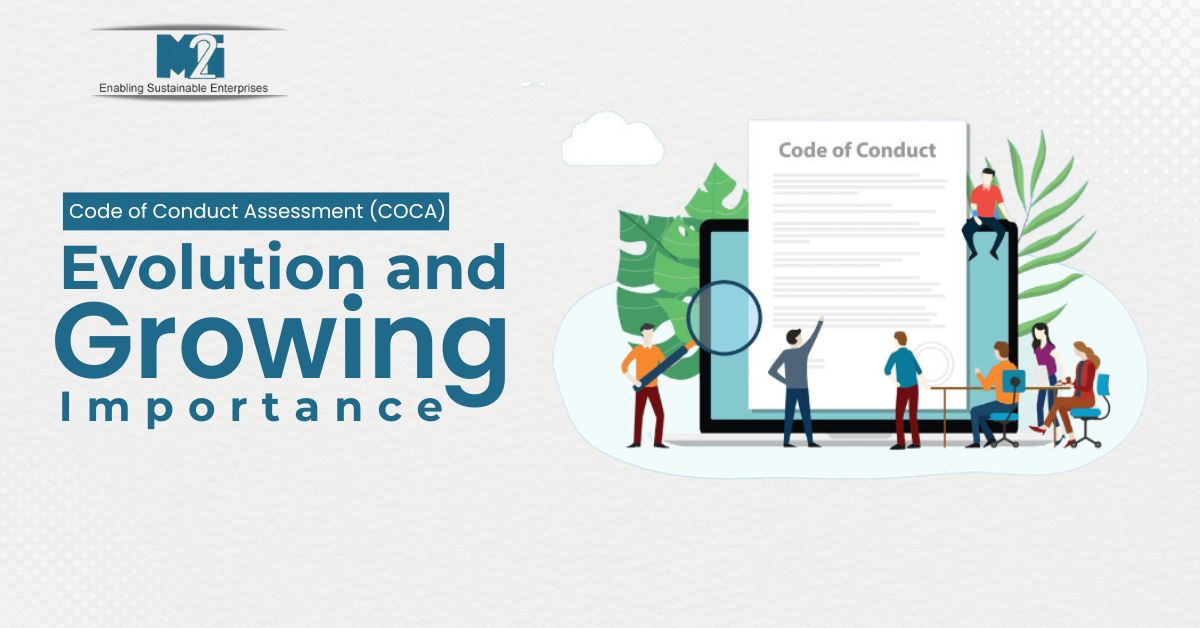
Code of Conduct Assessment (COCA): Evolution and Growing Importance
M2i maintains that for micro-finance to sustain, sound operational management practices, which strongly emphasize on ethical behavior and responsible lending are imperative.In order to assess adherence to ethical operational practices, M2i pioneered Code of Conduct Assessments for MFIs (COCA), performing the first of these assessments in the microfinance sector across the globe.
Development of COCA tool
Between 2005 and 2009 Indian MFIs registered very high growth rates. By 2010, concerns were being raised regarding operational practices of MFIs – high interest rates, lack of transparency, coercive recovery practices and general insensitivity of the MFI staff towards clients.
Responding to this, Small Industries Development Bank of India (SIDBI), one of the leading funders for MFIs, invited advisory firms to develop a tool to assess adherence of MFIs’ to code of conduct. M2i was the first agency to develop the tool and conduct the first 8 assessments.
M2i’s COCA tool
M2i’s COCA tool requires scores to be assigned on the seven Code of Conduct dimensions – Client Origination, Loan Pricing, Loan Appraisal, Client Data Security, Staff Conduct, Client Relationship and Feedback and Integrating Social Values into Operations, across the four parameters – Approval (A), Documentation (D), Dissemination (D) and Observance (O).
ADDO framework was developed by M2i for comprehensive assessment of organizational policies, systems and practices. The seven dimensions have been drawn from a review of the norms prescribed for MFIs including industry’s code of conduct, fair practices’ code of RBI and Smart Campaign’s Client Protection Principles. The COCA tool also specifically assesses the MFI for compliance against the RBI’s guidelines and scores it as well.
Mainstreaming of Code of Conduct Assessments
After successful completion of the first 8 assessments, SIDBI invited other service providers to develop the tool. We shared our methodology and reporting format with other service providers to help them develop the tool. Finally, four other service providers developed COCA assessment tools largely based on the assessment framework developed by M2i.
The Code of Conduct Assessment was soon being viewed as an important tool for the equity investors and banks in India to assess adherence to ethical operational practices. COCA formed part of covenants of many banks, and other institutions lending to the MFIs. Many equity investors also required MFIs to undergo Code of Conduct Assessment as part of their investment agreements.
Harmonization of Code of Conduct Assessments
By March 2016, COCA had become an essential requirement for bank lending to the MFIs. At the same time, it was being realized that since different agencies were using different methodologies, it was becoming difficult to compare rating grades/scores assigned by the different agencies. In July 2016, SIDBI organized a workshop to harmonized Code of Conduct Assessments which was attended by the important lenders to the MFIs, MFI Self Regulatory Organizations (SROs), agencies performing Code of Conduct Assessments and the SMART Campaign. It was agreed in the workshop that all agencies should use a common COCA methodology and reporting format for better comparison of COCA scores/grades performed by different agencies.
M2i was assigned to harmonize to Code of Conduct methodologies and develop a common assessment and evaluation framework. M2i developed the harmonized tool and reporting formats and trained all the rating agencies on the Harmonized framework. COCA was also integrated with institutional grading and MFIs’ performance was reported on two axes - COCA and institutional grading.
Impact of Code of Conduct Assessments
Between 2010 and 2019, Code of Conduct Assessments for almost all Indian MFIs have been performed, several MFIs undergoing assessment multiple times. M2i has performed 42 of these assessments. The COCAs commissioned by SIDBI have been published on its website. Since these reports are in the public domain, there is increased focus on the part of MFIs to improve their operational practices. These reports also provide a repository of desirable and undesirable practices.
COCA reports highlight best practices of MFIs on code of conduct dimensions. These also highlight undesirable consequences of undesirable operational practices such as indiscriminate application of joint liability and disproportionate staff incentives on disbursement of new loans.
Code of Conduct Assessments have led to significant improvement in operational practices of MFIs. Many MFIs have undertaken comprehensive review of their policies and intensive training of their field staff after undergoing Code of Conduct of Assessment.
Analysis of Code of Conduct Assessment reports of the MFIs now forms an important input for evaluating sector level practices pertaining to transparency, fair practices and client protection.
Bandhan’s view on Code of Conduct Assessments